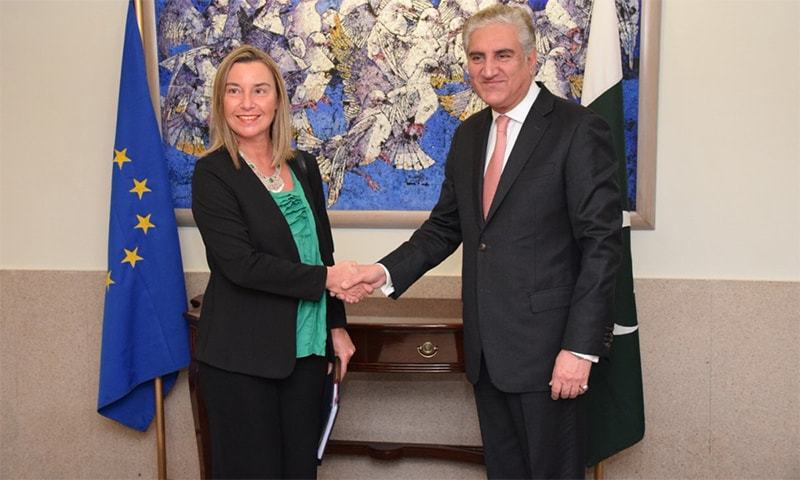Dr. Zafar Nawaz Jaspal |
The arrogant cum undiplomatic tone of Trump administration high-ups’ is distressing for Islamabad. Instead of realizing Pakistan’s limitations and appreciating its sacrifices in the war on terrorism, they are reiterating their unjustifiable allegations and demands. It seems, they are either frustrated or ignorant of the current situation in Afghanistan, which has been exposing US-led NATO alliance ineffectiveness in Afghanistan.
Since the announcement of President Trump South Asia policy, the government of Pakistan has been ensuring the people of Pakistan that it is able to guard and pursues the national interest of the country without the support of United States. On August 21, 2017, President Trump strongly criticized Pakistan. He accused Pakistan of providing “safe haven to agents of chaos, violence, and terror.”
Islamabad ought to avoid a hard line against Washington despite the latter coercive strategy and collusion with India. However, it does not mean to compromise on its national interest
Although, Islamabad was seriously disturbed by the accusation of President Trump, yet its response was very mature. It realis, the casual disregard of its intensive counter-terrorism and counter-insurgency efforts by Trump administration is neither in the interest of United States nor Pakistan. Thus, the absurd Trump South Asia policy did not affect its National Action Plan.
Read more: Trump & Modi’s Afghan deal: Stupid and bound to fail
Precisely, Islamabad continues its zero-tolerance approach towards terrorist and militant groups. Pakistani armed forces heroic military operations against the transnational terrorist groups has not only restored the writ of the state in the Federal Administrative Tribal Areas, but they are also unearthing and arresting terrorist facilitators residing in the urban centres of Pakistan.
The fencing of Afghanistan-Pakistan border disturbs a few Afghan groups, which are involved in illegal trade. These groups reaction, occasionally, hinders Pakistan and Afghanistan legal trade. But fail to dent the resolve of Government of Pakistan to manage the border security. While openly questioning the Americans’ coercive strategy, the government of Pakistan expressed serious concerns over India’s role in Afghanistan affairs.
Washington’s South Asia policy is immensely influenced by New Delhi. It is very irritating for Islamabad. Premier Abbasi opined that United States could treat Pakistan as an independent actor in its South Asian policy
At the same time, Islamabad ensured Washington to address its genuine concerns. The former firmly believe that India’s role in Afghanistan is destabilizing and threatening for Pakistan-Afghanistan relations. In fact, the Indian intelligence agency RAW in collusion with Afghan national intelligence agency is using the Afghanistan territory for launching terrorist activities inside Pakistan.
Read more: Old wine in a new bottle
Pakistan’s diplomatic response towards Trump policy was very calculated. Immediately, it announced the postponement of the then scheduled bilateral meetings between both states high-ups. However, restored within a few weeks. Prime Minister Shahid Khaqan Abbas met Vice President Mike Pence of the United States on the sidelines of the United Nations General Assembly meeting in September 2017.
The meeting resumed both states high ups diplomatic engagement. For instance, Pakistani Foreign Minister Khawaja Asif and US Secretary of State Rex Tillerson met in Washington during the last week. It generated cautious optimism about the practical engagement between both states. Pakistan’s indigenous nuclear weapons capability enable it to deter its archrival India’s aggression without the external support. The addition of tactical nuclear weapons in its arsenal have enhanced its armed forces confidence and checked India’s Cold Start strategy.
The meeting resumed both states high ups diplomatic engagement. For instance, Pakistani Foreign Minister Khawaja Asif and US Secretary of State Rex Tillerson met in Washington during the last week
The development of a sovereign defence capability is a big relief for Pakistan. On October 8, 2017, Prime Minister Shahid Khaqan Abbas stated, “the days of Pakistan depending on the US to meet its military and other requirements are over.” He added, “We have major US weapons systems in our military, but we’ve also diversified. We have Chinese and European systems. Recently, for the first time we inducted Russian attack helicopters.” The decreasing dependency on the American military hardware seems blessing for Pakistani armed forces.
Read more: India’s hysterical military stockpiling
Ironically, since a few years, Washington’s South Asia policy is immensely influenced by New Delhi. It is very irritating for Islamabad. Premier Abbasi opined that United States could treat Pakistan as an independent actor in its South Asian policy.
In fact, the Indian intelligence agency RAW in collusion with Afghan national intelligence agency is using the Afghanistan territory for launching terrorist activities inside Pakistan
“We don’t believe that injecting India into the Pakistan-US relationship will help resolve anything, especially in Afghanistan, where we don’t see any role for India. India has a relationship with the US. That is between them and the US.” Certainly, assigning India a greater role in Afghanistan undermines Pakistan national security.
To conclude, Islamabad ought to avoid a hard line against Washington despite the latter coercive strategy and collusion with India. However, it does not mean to compromise on its national interest. Hence, Islamabad needs to chalk out an intelligent cum rational policy towards United States.
Dr. Zafar Nawaz Jaspal is Associate Professor, School of Politics and International Relations, Quaid-i-Azam University, Islamabad. He is also an advisor on Non-Proliferation to SASSI, London and a course coordinator at Foreign Services Academy for the Pakistan Ministry of Foreign Affairs. Email: jaspal_99@hotmail.com. This piece was first published in Pakistan Observer. It has been reprinted with permission. The views expressed in this article are the author’s own and do not necessarily reflect Global Village Space’s editorial policy.














